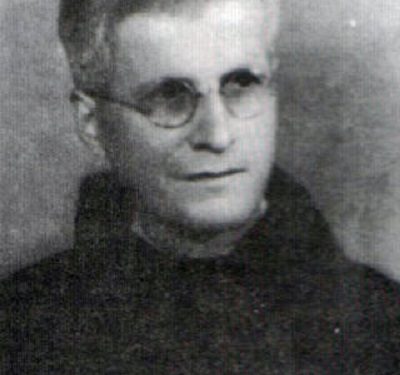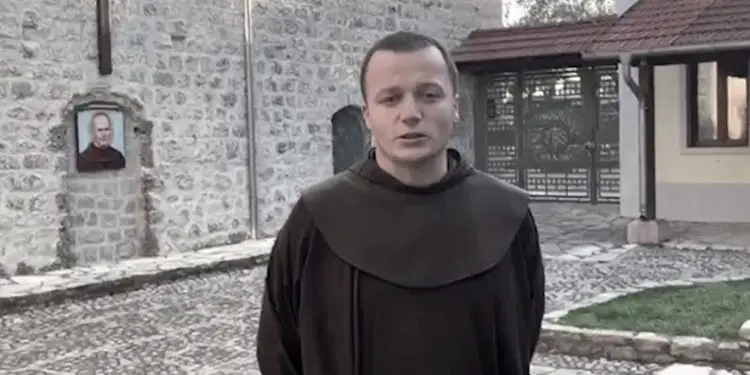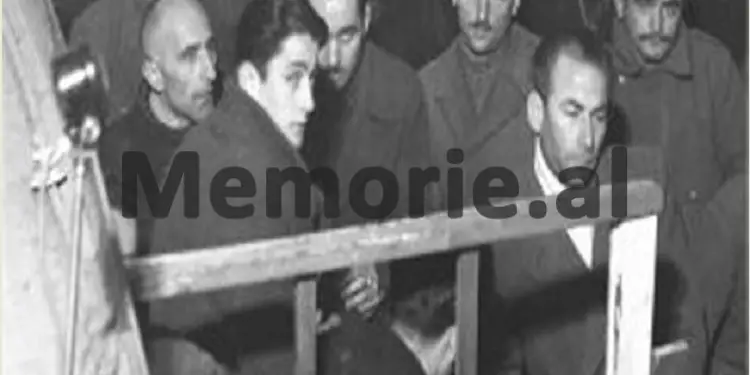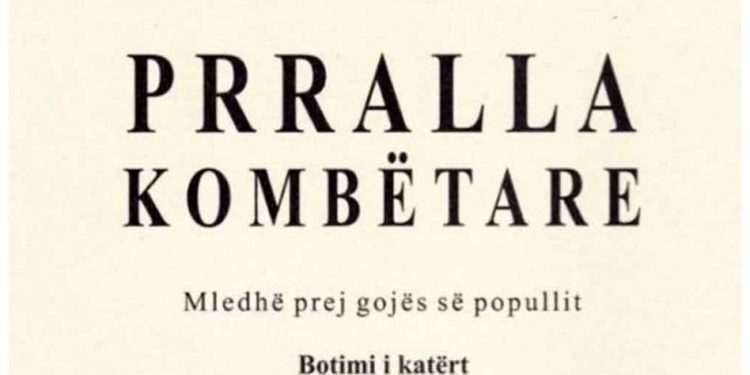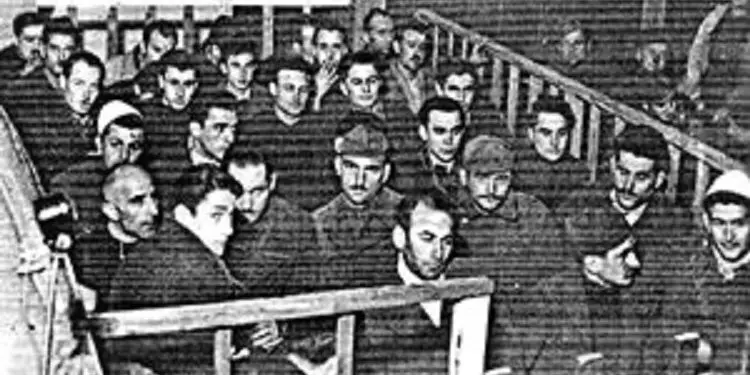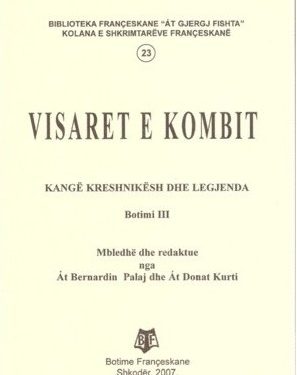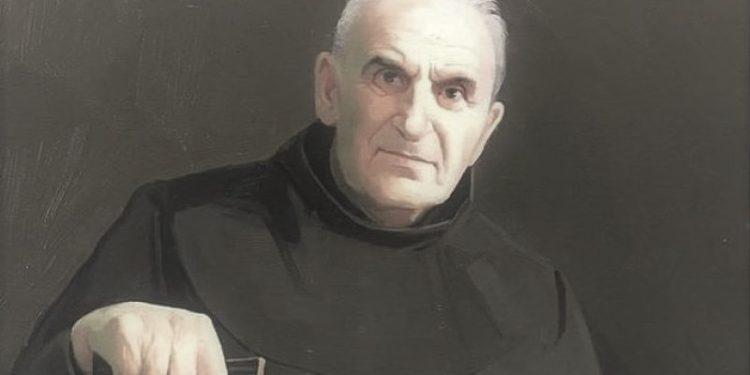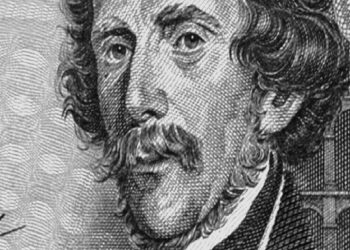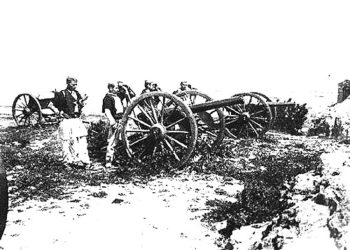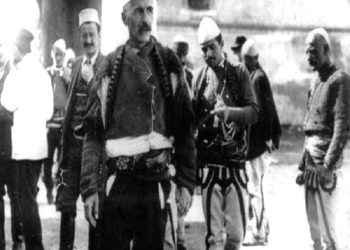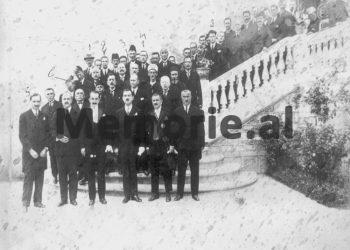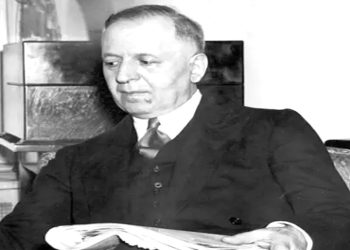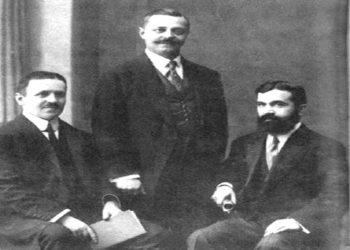By Father Vitor Demaj
Memorie.al / The judging panel, for hatred against religion, accused Father Donat Kurti of; “conspiracy against the communist government”. With dedication and the Franciscan spirit, the collector of national tales answers: “My weapon is the pen, with which I have collected and published the most beautiful stories of the bravery of the people: ‘VISARET E KOMBI’.” I have collected and published two volumes of ‘NATIONAL FAIRY TALES’, where the wisdom, philosophy and wisdom of our people are presented, to teach children more easily the exercise of virtues and the fight against vices”!
Republic of Albania – Vatican
On November 10, we remember the anniversary of the death of the Franciscan martyr and scholar Father Donat Kurti (Shkodër, September 3, 1902 – November 10, 1983), teacher, ethnologist, folklorist, outstanding researcher, and Albanian translator. An extraordinary and multifaceted figure, the Franciscan of the “Visares of the Nation”, the “Viollca of Albanian letters”, as Father Zef Pllumi called him, the Franciscan brother, Father Donat Kurtin, who had everything and put himself at the service of the Religion and the Fatherland he gave to God the culture of his Albanian people.
Father Donat Kurti’s name as a researcher appears in many fields of Albanian studies, in linguistic, historical, ethnological and mainly folkloristic. The life of this wise and wise scholar is closely related to the fate of Albania, because a good part of his life, from 1945 until he died in 1983, was spent in torture, imprisonment and a complete silence. You were imprisoned and strictly forbidden to “fly through the nests” built on the top of the mountains, where nothing can stop the “flying” spree.
In 1948, when he was in front of the jury, Father Kurti was waiting for the claim, after giving you the opportunity to say the last word, he declared: “From you, I do not expect anything good, even though until today, I have not I’m sorry. Neither death nor prison impresses me, but I’m sorry that I left half of my work. All my life, all my talent, I have spent only to serve the Albanian people, regardless of the sacrifices and privations” (Father Zef Pllumi., ‘The great Franciscans’, “Ilar” Publishing House, Tirana 2001, 125-126).
When the jury, blinded by hatred, accused Father Kurt of conspiracy against the communist government, with humility and the Franciscan spirit, the collector of national tales, answered: “My weapon is the pen with which I collected and published the poems most beautiful of the bravery of the people: ‘VISARS OF THE NATION’. I have collected and published two volumes of ‘NATIONAL TALES’. They are not just fairy tales, but there is presented our wisdom, philosophy and wisdom of our people to teach children more easily the exercise of virtues and the fight against vices. If you give me death, all the work remains half done, while if you sentence me to prison, I ask you to allow the continuation of my work so far, only for the benefit of the Albanian people!” (Father Zef Pllumi, Great Franciscans, “Ilar”, Tirana 2001, pp. 125-126).
This was Father Donat Kurti’s wish: to continue the work of collecting Albanian folklore, because there he discovered the formation of the spirit of the Albanian people, its origin from the Illyrians, its autochthony. The prison didn’t spare you, but the job didn’t stop either, not because of the state privileges, because they brought him fear of suffering and torture, but because of the desire of this Franciscan, to fulfill his mission, for the good and progress of the Albanian people of studies about the customs of his docks.
The Albanian Franciscan Province, in the Column of Franciscan Writers, started in 2005, in the continuation of the publications of the works of Franciscan Writers, published the work “Albanian Customs” in 2010. Father Donat Kurti, this manuscript is collected in several notebooks and stuck together; we finished writing it in 1967. For its writing, the author took a lot of trouble, due to the means and circumstances of the time, when he lived.
How do they describe this difficulty to us, in the preface that he made to the work: “Unfortunately, in compiling this work, I did not have the opportunity, I did not use the magazine ‘Hylli i Drita’, nor the magazines or books that speak about the habits and life of the Albanian people. I have burdened, I have had the chance to meet him personally, live, and even more, hang out with the mountaineers. As a researcher and investigator, often boring, I am careful to take the points to the end, without leaving any gaps, and to present them faithfully, as I felt them, even to some extent comparisons between different provinces” (At Donat Kurti, Habits of Albanian customs, 2nd edition, Franciscan publications, Shkodër 2010, pg. 21).
Unfortunately, the author says that he has not had the opportunity to study and research in books that talk about and deal with this issue, but he is busy with those materials that he himself has found and saved with difficulty, as well as with research and investigations in the field that is, in conversations with people from different provinces, who had inherited, or lived every day among these customs and traditions. As a vulnerable and tireless researcher and collector, he compiled this work with a rare master, leaving us a monument of cultural heritage. In addition to pieces of letters and notes, preserved with difficulty, Father Donat Kurti, as a biliographer of choice, has the simple man of the mountains and northern cities, where he knows in detail about some issues that had to do with life his”.
The work of Father Donat Kurti
The purpose of the work: let me know the antiquity of the Albanian people through Albanian customs and traditions. This Franciscan, good in spirit, was in love with the simple Albanian life, with the man, the virtues, the faith, with the way this life appeared in extraordinary habits and harmony, in all its beauty. Father Kurti, in the Albanian tribe, had distinguished the generous and individual spirit, Illyrian-pagan with old customs and docks of Indo-European origin, as it is the case at sunrise that the Albanian of the mountains, turns and makes a cross (Father Donat Kurti., op. and cit. pp. 168-169). Not only that, but no action is taken or worked without first seeing the monthly process of eating (Albanian world. Publication of the Ministry of Education, Tirana 1943, 42.).
“National visar” – writes Kurti – is inexhaustible. The more you live among our people, the more you find why you obey, why you study and even why you are proud, because the different folklore elements go together and wear the skeleton of old typical Albanian, and they are the clearest evidence of his early nobility and greatness” (Father Donat Kurti., The National Tale, Publishing Françeskane, Shkodër 2005, 5.) For Kurti, Palaj, Gjeçov, etc., the spirit of the Albanian appeared in front of us, like that old oak tree whose layers were filled with centuries of life, passing through different periods, trials, tribulations, and joys bursting in its branches, as evidence of a prehistoric secret, and a typical Indo-European tribe.
Father Donat Kurti, together with Father Bernardin Palaj, another Franciscan, took care of collecting song of kreshniks, songs of bravery preserved over the centuries in the mountains, where modern life had penetrated little or not at all. Fortunately, in these lands the spirit and typical physiognomy of the Albanian was preserved, untainted by the five-century Anatolian occupation. So why, Brother Donat Kurti, did you take this job, I know that your efforts have not been in vain.
The mosaic was not complete, only with “Visaret” and “Prrallat”. To complete this magnificent mosaic of the Albanian soul, to tell the dough of what it is made of, another work was needed, which would include the entire Albanian life in all its explosions and feelings. The work, according to our opinion, has reached its goal, as Kurti himself says: “I hope that the effort is no longer with them. Here, everyone knows the life of the Albanian people in its former simplicity, in accordance with nature and with the noblest virtues, which have been practiced for centuries and centuries, both in family life and in social life”! (Father Donat Kurti, op. cit., pg. 21).
The purpose of the work, of this study, is to know the Albanian life in relation to oneself, to others, to the faith of his superstition, etc., to know the pure Albanian race. This detailed collection of Illyrian-Albanian customs and traditions is first of all a testimony to the antiquity of this people. where not even the spread of Christianity managed to undo them, they are a basis for future studies in this field, because Kurti himself tells us: “It is necessary, that our customs, as well as the characteristics of the Albanian Nation” with the best and worse”, let the Albanian himself, researcher and scientist, study and evaluate them” (Father Donat Kurti, op. cit., pg. 20).
This is also Father Donat Kurt’s will. Before judging, this or that custom or tradition, as bad and destructive of the family and social life of our people, or as an indicator of a weak civilization, we must see it and study it, understand the social situation and politics of the people of the mountains and, in general, of the North of Albania.
In this work mainly, the customs and traditions of the people of Dukagjin are dealt with, because: “Well, it is a great effort to take these scattered writings into our hands and bind them together and make them heavier, therefore, for me presented in a more concise way the life of the Albanian people, among their customs, I thought of taking as a type, or as an example, the Tribe of Dukagjin, which until today has kept them in the purest state, both customs and traditions , songs, folklore” (Father Donat Kurti, op. cit., pg. 20).
Special
A special feature of this paper is the parallels between customs and traditions in different areas, the same customs and traditions seen in Dukagjin, as in Malsi i Madhe, Mirdita, Pukë, Zadrimë, Dibër, etc. common similarity, although across different countries. By doing this, Father Donat Kurti, has managed to present a general panorama, inclusive of the Albanian life of the inhabitants of the North, with their customs, customs, and mythology. The book deals with the development of family and social life: the tribe, the bajrak, the organization of the bajrak, the construction of the house, and the house in relation to this.
The Franciscan Father Donat Kurti deals in detail with the beautiful Albanian tradition of friendship, that is, with the highest virtue of the Albanian. In particular, engagement and marriage, as the main element of family life, are analyzed and presented. In the treatment of engagement and marriage, there is no shortage of proverbs and superstitions, where the reader is taken to ancient times, of Illyrian rites. A special place in this masterpiece is also the study of fictional characters, such as clocks, fairies, snowflakes, the beauty of the earth, kulshedra, the dragon, etc.
One of the customs that has attracted the attention of folklore researchers is the mixing of Christian holidays with non-Christian, Illyrian rites. Researches on the economic life, on the simple but meaningful cultural life of the highlanders. He concludes his study with the examination of death among Albanians, especially presenting the way death is faced, in terms of old traditions. The proverbs and superstitions have a special importance; we put them at the end of each chapter.
That, even a work of deja, a source for our customs and traditions, collected by a man who had and has primary authority, in this field, is added to the folklore and ethnographic studies of the Albanian people.
Father Donat Kurt’s biography
Father Donat Kurti died in Shkodër on September 3, 1903. The life of this Franciscan was full of fruitful creativity for Faith and Homeland. Compiler of the “Cycle of Kreshniks”, “Fairy Tales”, “Customs of the Albanian Docks”, “History of the Franciscan Province”, and “National”, he is among the greatest scholars of the nation and of Albanian Franciscanism.
Father Donat Kurti, rector of the Serafik College, director of the “Illyricum” junior high school. In 1937, from the “Sant’Antonio” University of Rome, he was awarded the title of “Doctor of Science”. Kje professor of linguistics, and during his activity, he wrote in the magazines “Hylli i Drita” and “Zani i Shna Ndout”. For his beautiful and valuable writings and for his research in the mountains of the North, on folklore, here are the names “Albanian Anderseni”.
He published “National Tales” and “Kanghe Kreshnikesh and Legend” in collaboration with Father Bernardin Palaj. For the needs of the school, he translated or worked on many valuable books, such as: “Latin Grammar”, part I, Morphology (by Dr. A. Shcheindler, 1933); “Syntax of the Latin language”, I 1939, (by Dr. A. Shcheindler); The cultural work of the Catholic element in Albania”, publication of the temporary “Hylli i Drita”, starting from no. 3, 1933, etc., as well as many studies, on folkloric, linguistic, historical, religious problems, etc.
He was arrested on May 12, 1946 and sentenced to 5 years in prison. During the court session, he declared: “I don’t expect anything good from you, even though until today, I haven’t seen anything bad.” Neither death nor prison impresses me, but I’m sorry I left half the work. I have spent my whole life, all my talent, just to serve the Albanian people, regardless of the sacrifices and privations”.
The creativity of this Franciscan did not stop only in the literary lama, but also in the pedagogical and religious one. In the midst of his manuscripts, we come across several translations of the Holy Scriptures, catechism preparations, translations, etc. All these works were done in the most difficult moments of the Albanian people. Therefore, we can say with full conviction that; Father Donat Kurti was also a prophet, who with his tireless work, warned of the fall of communism, the return of human and religious freedom.
Then, he was arrested and sentenced to 25 years in prison, all of which he served. This is among all the communist extermination camps. In the end, he was sent to Burrel prison, from where he was released. He lived in a poor house, and in a poor house, he was abandoned by almost everyone. During the time when he was released from prison, he was insulted, insulted and insulted by people on the road, but there were also people who called him “Father” and “Professor”. This is the fate of this Franciscan scholar. During his life, the humble Franciscan spirit was distinguished in him, the love for everyone, even for those who tortured him and made him suffer, but he never denied his ideals.
He died in Zotin with 10 November in 1983, in Shkodër in an orphan hut, at the age of 80, of which, 62 as an orderly and 56 as a priest. Here in the tomb of the Stom Golem. After the fall of communism, his remains were placed in the friars’ cemetery, in the Franciscan Church of Gjujadoli.
In 2003, Father Donat Kurti’s historical study ‘Albanian Franciscan Province’ was published, Franciscan Publications Shkodër, under the auspices of Kolec Çefe. Since the beginning of the publication of the works of Franciscan writers, since 2005, we have published in Franciscan Kolana, the following works of this writer: 1. National Herald I, Shkodër 1940. Reprinted Shkodra 2005. – 2. National Herald II, Shkodër 1942 Reprinted in Shkodër 2005. – 3. Visaret e Kombit, Shkodër 1937. Reprinted in 2005. – 2007, in collaboration with Father Bernardin Palaj, ofm. – 4. National Games, Franciscan Publications, Shkodër 2007. – Albanian Customs, Franciscan Publications, Shkodër 2010, under the auspices of the Albanian Franciscan Province, where the literary proofreader of the book is the well-known researcher, Ledi Shamku – Shkreli./Memorie.al




